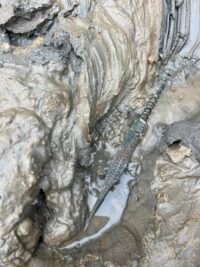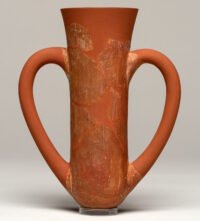An excavation at the site of a future road reconstruction in Cambridgeshire has uncovered two well-preserved Roman wooden wells, revealing engineering flaws and how they were corrected. The first well collapsed; the second had reinforced walls built to avoid the same fate.
The wells were discovered by a team of archaeologists from the Museum of London Archaeology (MoLA) during excavations of a known Iron Age settlement, which was founded around 350 BC, long before the Roman conquest. The sleepy farm turned to industrial activity after the Romans began occupying the settlement in 43 AD. The team found a large gated enclosure with archaeological evidence of metalworking and woodworking.
 The new activities required water, so the Romano-British began digging a new well. They had to dig very deep—almost 28 feet deep—to get water for the first well. They built a square wooden well, but it collapsed before it could be used. The wooden ladder was left inside, and the well was abandoned. The second time, they dug only 21 feet deep and lined the well with flat wooden planks. There were also stones at the bottom of the well to filter the water that was pumped out of the thick clay. Finally, it was also abandoned. There were debris, wood chips, and sawn-off branches inside, proving that the previous well had been used as a garbage dump by carpenters. The amount of waste wood discarded was evidence of the existence of a considerable industry.
The new activities required water, so the Romano-British began digging a new well. They had to dig very deep—almost 28 feet deep—to get water for the first well. They built a square wooden well, but it collapsed before it could be used. The wooden ladder was left inside, and the well was abandoned. The second time, they dug only 21 feet deep and lined the well with flat wooden planks. There were also stones at the bottom of the well to filter the water that was pumped out of the thick clay. Finally, it was also abandoned. There were debris, wood chips, and sawn-off branches inside, proving that the previous well had been used as a garbage dump by carpenters. The amount of waste wood discarded was evidence of the existence of a considerable industry.
Experts will be examining the well’s contents. Some of the larger pieces even bear decorations, including horizontal lines and crosses, which could provide clues to what was found here.
While efforts are still underway to pinpoint what exactly the Roman carpenters were doing, MOLA archaeologists have found evidence that the workshop was part of a wider trade network. At the southernmost end of the site, the team discovered a possible Roman road. This road would have connected the site to major Roman routes, so they may have supplied larger settlements such as Godmanchester and nearby villa rustica (Roman country estates).


 Anal Beads
Anal Beads Anal Vibrators
Anal Vibrators Butt Plugs
Butt Plugs Prostate Massagers
Prostate Massagers
 Alien Dildos
Alien Dildos Realistic Dildos
Realistic Dildos
 Kegel Exercisers & Balls
Kegel Exercisers & Balls Classic Vibrating Eggs
Classic Vibrating Eggs Remote Vibrating Eggs
Remote Vibrating Eggs Vibrating Bullets
Vibrating Bullets
 Bullet Vibrators
Bullet Vibrators Classic Vibrators
Classic Vibrators Clitoral Vibrators
Clitoral Vibrators G-Spot Vibrators
G-Spot Vibrators Massage Wand Vibrators
Massage Wand Vibrators Rabbit Vibrators
Rabbit Vibrators Remote Vibrators
Remote Vibrators
 Pocket Stroker & Pussy Masturbators
Pocket Stroker & Pussy Masturbators Vibrating Masturbators
Vibrating Masturbators
 Cock Rings
Cock Rings Penis Pumps
Penis Pumps
 Wearable Vibrators
Wearable Vibrators Blindfolds, Masks & Gags
Blindfolds, Masks & Gags Bondage Kits
Bondage Kits Bondage Wear & Fetish Clothing
Bondage Wear & Fetish Clothing Restraints & Handcuffs
Restraints & Handcuffs Sex Swings
Sex Swings Ticklers, Paddles & Whips
Ticklers, Paddles & Whips







 Experts will be examining the well’s contents. Some of the larger pieces even bear decorations, including horizontal lines and crosses, which could provide clues to what was found here.
Experts will be examining the well’s contents. Some of the larger pieces even bear decorations, including horizontal lines and crosses, which could provide clues to what was found here. While efforts are still underway to pinpoint what exactly the Roman carpenters were doing, MOLA archaeologists have found evidence that the workshop was part of a wider trade network. At the southernmost end of the site, the team discovered a possible Roman road. This road would have connected the site to major Roman routes, so they may have supplied larger settlements such as Godmanchester and nearby villa rustica (Roman country estates).
While efforts are still underway to pinpoint what exactly the Roman carpenters were doing, MOLA archaeologists have found evidence that the workshop was part of a wider trade network. At the southernmost end of the site, the team discovered a possible Roman road. This road would have connected the site to major Roman routes, so they may have supplied larger settlements such as Godmanchester and nearby villa rustica (Roman country estates).












